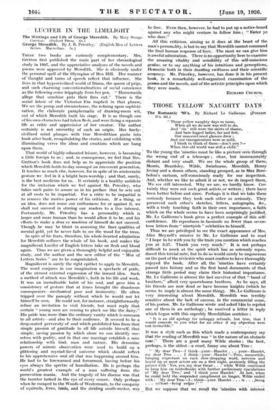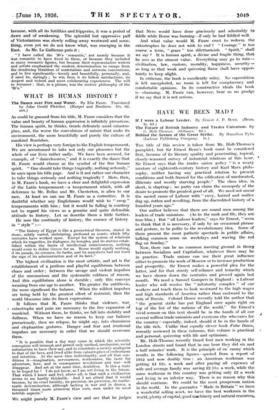THOSE' YELLOW NAUGHTY DAYS,
The Romantic '90's. By Richard Le Gallieime. (Putnam,
- les. 6d.)
• " Those yellow naughty days so tame, When all do now was still to do,
And ` sin '• still wore the -skiits of shame, And bare-legged latlies,'far and few; Our unaccustomed glances drew ;
And our transgressions were so mild, I blush to think of them—don't you When this old world was still a child."
To the young the 'nineties must be like a picture seen through the wrong end of a telescope ; clear, but iinmeasiimbly distant and very small. We see the whole group of them, Morris, Beardsley, Wilde, Swinburne, Meredith, Henry Irving and-a dozen others, standing grouped, as -in Max Beer- bohm's cartoon, self-consciously ready for our inspection.
And, whether we like to admit it or not, we do inspect them, We are still interested. , Why, we are, we hardly. know. Cer- tainly they were not such great artists or writers there have been better &lore and since. Perhaps it is that we take them seriously because they took each other so seriously. They preserved each other's 'sketcheS, 'letters, autographs, &c., with a truly touching faith in their own importance, a faith which on the whole seems to haVe been surprisingly justified. Mr. Le Gallienne's book gives a perfect example of this self- confidence. He reproduces in facsimile no fewer than seven- teen letters from " ninetyiSh " celebrities to himself.
Thus we are privileged to see the exact appearance of Mrs. Alice Meynell's missive to Mr. Le Gallienne and to read " I hope to be with you by thetrain you mention which reaches you at 3.37. Thank you very much." It is not perhaps difficult to mock at the spirit which' hai so solemnly repro- duced this trivial note; Etitto do'io'irelikliirely be Ungenerous on the part of the reviewer Wit) must confess to hive thoroughly enjoyed the book. After all, the 'nineties have certainly passed into history and so the first hand documents of that strange little period may claim their historical importance. Mr. Le Gallienne is almost the lost`survi•eorof that " band of brothers," albeit very quarrelsome. brothers. As he SayS, all his friends are now dead or haVe becotne knights (Which he seems to imply is almost the same thing). Mr. Le Gallienne is very interesting about Meredith. Meredith was terribly sensitive about the lack of success, in the commercial sense, of his poems. Mr. Le Gallienne Witte and asked;hiM to reprint one of them in an anthology ; he received a letter in reply which began with this superbly Meredithian sentence : " It is an old apology for unhappy refusals' but true, that I would concede to you what for no other if my objection- Were
not invincible." - - - - - -
It was a style such as this which made a contemporary say that the reading of Meredith was " in the-nature-d'art obstacle rase." There are a good many Wilde stories ; the best, perhaps, is the oldest—a cruel, funny one about Tree : " My dear Tree—I think—your—Hemlet . . . your—Hamlet, dear Tree . . . I think-:yourl---Hainlat '—Tree, meanwhile, - hanging expectant on each slow-dropping word, nervous and keyed up as most actors are on a first night, anxiously filling the pauses with ' Yes, yes, my dear Oscar . . . while Wilde' continued to keep him on tenterhooks with further preliminary ejaculations of `My dear Tree,' and `_ I_ think your Hamlet.' At last, when he could hold the' suspended compliment no longer, Wilde ended with ` My dear Tree=I7-think—your Hamlet . . . is . . . funny . . . without--being vulgar "
But we suppose that we recall the 'nineties with interest because, with all its futilities and fripperies, it was a period of. dawn and of awakening. The splendid but oppressive pall of Victorianism was slowly rolling away westward and some- thing, even yet we do not know what, was emerging in the East. As Mr. Le Gallienne puts it :
" I have called the '90's ' romantic,' ,not merely because it was romantic to hve lived in then;i, or becalms they included. go Many romantic figures, bid because their representative writers' mid artists emphasized the modern determination to escape from the, deadening thraldom of materialism and outworn conventions,, and to live significantly--keenly and beautifully, personally, and, if need be, daringly ; to win from it its fullest satisfactions, its deepest and richest and most exhilarating experiences. The will to romance : that, in a phrase, was the motive philosophy of the'











































 Previous page
Previous page